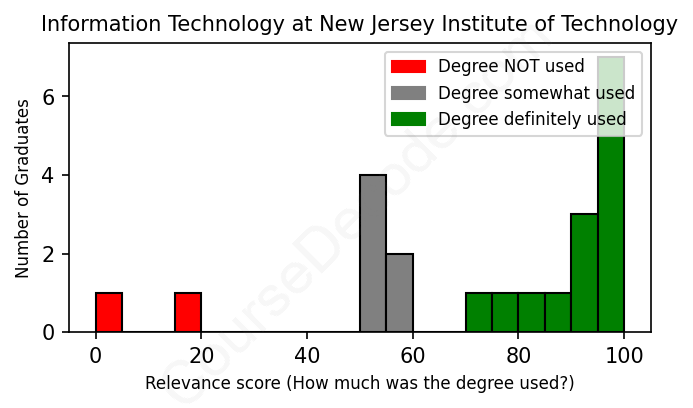
First, some facts. Of the Information Technology graduates from New Jersey Institute of Technology we've analyzed , here's how many have used (or NOT used) their degree in their career:

These are estimates based on AI analysis of 22 LinkedIn profiles (see below).
The verdict? Above average. Overall, with an average relevance score of 74%, Information Technology graduates from New Jersey Institute of Technology have a higher likelihood (+7%) of finding work in this field compared to the average graduate across all fields:
And for comparison, here's the chart for all profiles we've looked at across all degrees.
Also, after graduating, only 18% of these graduates have pursued further education other than another Bachelor's degree (such as a Masters degree or other), compared to the average across all profiles of 35%. This suggests a Bachelors degree is enough for most Information Technology graduates, and it's normal to look for work straight after graduation.
See the details:
|
Relevance score: 4% We think this person has NOT gone into a career related to their degree. We think this person has NOT gone into a career related to their degree.
DEGREE INFOGraduated in 2020 from New Jersey Institute of Technology with a Bachelor's degree in Information Technology. No other secondary education since. JOB HISTORY SINCE GRADUATIONContract Administrator Marotta Controls Jan 2022 - May 2024 Contract Administrator II  Marotta Controls May 2024 - Present ABOUTNo information provided. |
The top 10 most common jobs done by the graduates we've analyzed (ranked most common to least) are:
When looking at the career paths of graduates from the New Jersey Institute of Technology with degrees in Information Technology, it’s clear that many of them end up in roles that vary in their relevance to the field. A lot of these jobs lean towards IT-specific positions like Software Developers, System Engineers, and Cybersecurity Specialists, which directly utilize the technical knowledge and skills learned during their studies. It’s no surprise that these roles are prominent, as they require a solid understanding of programming, systems analysis, and IT security—core components of an Information Technology degree.
However, there’s also a significant number of graduates who take on roles that aren’t strictly aligned with IT. For instance, jobs like CRM Specialists, Tax Technicians, or Project Coordinators often focus more on administrative tasks or customer interactions, with only a sprinkle of technical skills involved. This balance shows that while many graduates do find suitable roles within the IT field, others expand into broader career opportunities where their degree isn’t directly applied on a daily basis. Ultimately, it’s a mixed bag, but the solid foundation of IT knowledge provides a versatile base that helps alumni adapt to various job markets.
Here is a visual representation of the most common words in job titles for Information Technology graduates (this is across all Information Technology graduates we've analyzed, not just those who went to New Jersey Institute of Technology):

The career trajectories of graduates from the Information Technology program at New Jersey Institute of Technology (NJIT) tend to start off pretty strong, with many landing their first jobs in relevant IT positions shortly after graduation. For example, several graduates have taken on roles such as Software Developer, Technical Support Engineer, and Cybersecurity Specialist right after finishing their degrees. This early entry into specialized roles is encouraging and suggests that the program has equipped them with solid technical skills applicable in the workforce. Most of these individuals seem to quickly find themselves in positions that not only match their educational background but also set the stage for upward mobility in their careers.
Looking a bit down the line, there's a noticeable trend where many graduates five to ten years in are advancing to more senior roles, such as Software Engineer II, Cyber Risk Project Delivery Specialist, or even managerial positions. Companies like Amazon, IBM, and Deloitte have employed a significant number of NJIT alumni, indicating that graduates are landing solid positions with reputable organizations. This implies that, overall, graduates of NJIT are leveraging their education to build successful and relevant careers in the IT field rather than veering off into unrelated industries. The pathways seem promising, and the progressive nature of their positions suggests that they are not just surviving but thriving in the tech world.
Getting a Bachelor’s degree in Information Technology at NJIT isn't a walk in the park, but it’s not the hardest degree either—it's pretty much in the middle. You’ll tackle a mix of computer science courses, programming, and hands-on projects, which can definitely get challenging, especially if you're not familiar with coding or tech concepts. But if you're passionate about tech and put in the effort, it can be super rewarding. The pace can feel fast at times, and you’ll have to juggle assignments and labs, but many students find it manageable if they keep up with the work and ask for help when needed. So, if you’re willing to invest the time, you'll likely do just fine!
Most commonly, in the LinkedIn profiles we've looked at, it takes people 4 years to finish a Bachelor degree in Information Technology.
Looking at these IT grads from NJIT, it seems like they've generally found decent gigs, especially those who graduated a bit earlier, like in 2016 or 2017, some even landing spots at big names like Amazon and IBM. The pay in tech roles tends to be pretty solid, and most of them have climbed the ladder into roles that usually offer a good salary. For example, someone going from an SDE at Audible to AWS likely saw their earnings increase significantly. However, there are a few who had more scattered early career paths—like some freelancing or short-term gigs—that might not have paid as well, but they’re still in the game and building experience. Overall, if you want to do well financially in tech, these tracks suggest it’s definitely possible!
Here is a visual representation of the most common words seen in the "about" section of LinkedIn profiles who have a Bachelor degree in Information Technology (this is across all Information Technology graduates we've analyzed, not just those who went to New Jersey Institute of Technology). This may or may not be useful:

Here are all colleges offering a Bachelor degree in Information Technology (ordered by the average relevance score of their Information Technology graduates, best to worst) where we have analyzed at least 10 of their graduates: